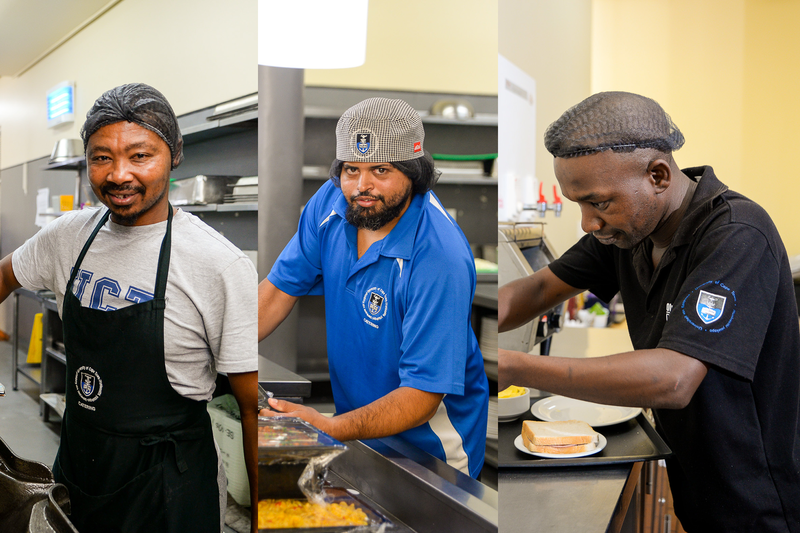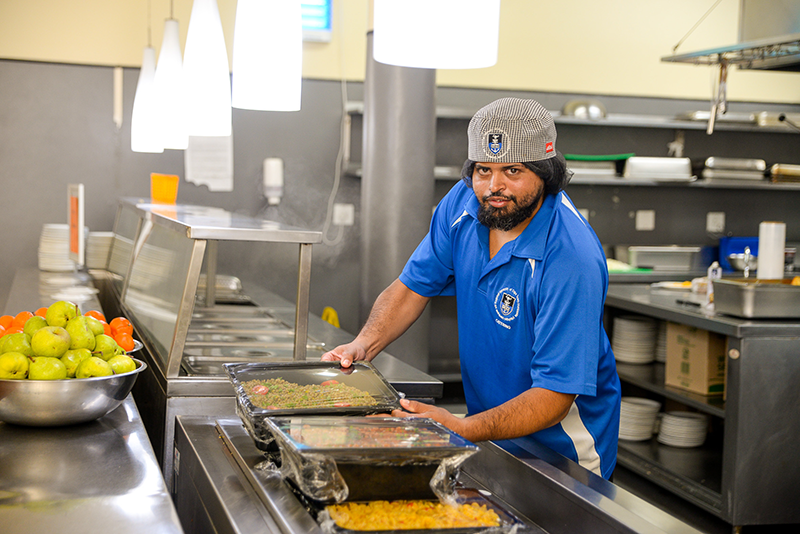Workers’ Day: When silence speaks
30 April 2024 | Story Niémah Davids. Photos Robin Thuynsma. Read time 7 min.
It’s 10:30 and the Graça Machel dining hall in the all-girls residence on lower campus is unusually quiet. Breakfast has come and gone, the students have dispersed (for now), and the large dining hall is spick and span.
But by the sounds of the clitter clatter coming from the kitchen, the University of Cape Town’s (UCT) residence catering team is already hard at work preparing lunch. With only an hour and a half left before some hungry tummies pull up their chairs and expect to be served their second meal of the day, there’s not much time left to ensure that everything is top notch. It’s the eve of the Easter weekend and many students are home for the holidays. But judging by the bale of boerewors and the large deep fryer filled with crumbed calamari, quite a few have chosen campus as their holiday destination. For a cooking novice, prepping everything seems like a mighty task, but for those who have been employed to do the job, it all comes naturally, and everyone has a role to play.
Keith Dwangu agrees. Dwangu, Moegamat Yusuf Abrahams and Olwethu Masebeni are food service assistants – an integral part of UCT’s Student Housing and Residence Life team. On Thursday, 28 March, they were seconded to Graça Machel Hall for the morning to help in the kitchen and the dining hall. At first glance, the trio seem no different to their colleagues, who are working in a flurry to conclude lunch preparations and joking around as they get the job done.

However, Dwangu, Abrahams and Masebeni are Deaf. They are three of only six Deaf staff members in the Student Housing and Residence Life team. Ahead of Workers’ Day on 1 May, UCT News spent a few hours in their company, to get a sense of their daily grind. This feature forms part of the newsroom’s Workers’ Day series and profiles several members of the campus community to showcase their work.
“As a member of staff with a disability, I am very grateful that the university has given me this opportunity. They could’ve employed someone else, someone with hearing abilities, to maybe make things easier for everyone. But they chose me, and they chose me because they believe I have what it takes. I hope never to let anyone down,” Dwangu said.
Residence all-rounder
As he coated a batch of calamari strips and dropped it into hot oil, he signaled to one of his colleagues to take over operation fry-up. When she did, he moved out of the kitchen and into the dining hall and sat down at a table beside Abrahams and Masebeni.
It’s during this conversation, which used simple, affirmative hand gestures and a written question-and-answer sheet (between Deaf and hearing colleagues) that Dwangu said their work as food service assistants is anything but one dimensional. And what’s great, no two days are the same, which they really enjoy. Ensuring that the kitchen is clean and tidy, stocking the fridge with necessities and completing stock-taking exercises for their supervisors are just a few of their daily to-dos. But that’s not all. They also help the food service cooks prepare students’ meals, which come with extra perks because it teaches them little dos and don’ts they can easily incorporate at home, he added.

And in South African Sign Language, his colleagues concur. Over the years they’ve also learned useful kitchen hacks from the chefs. Abrahams, who’s based at Clarinus Village in Observatory, leaned in and grabbed a pen, eager to jot down his thoughts: “I love this job because I get to learn something new every day. Sometimes it’s in the kitchen, other times it’s somewhere else. But every day I get to learn. I also love working with the students. They make me laugh a lot. They respect me and I respect them.”
Learning and growing
For Masebeni, working in the kitchen at Kopano Residence, just a stone’s throw from Graça Machel Hall, has been a valuable learning experience. It has contributed to his personal and professional development and is an opportunity he doubts he would’ve found elsewhere.
Over the past 14 years, he said he has learned about the importance of food safety, multitasking (because the kitchen can become a highly pressured environment), and effective communication. With the latter in particular, he said, the trio are constantly finding unique and fun ways of communicating with their colleagues – who are not proficient in Sign Language – to get their messages across. This teaches them to think creatively.
“I am not the same person I was when I first got here because I have learned so many different things. So, every day I am excited to come to work and I count myself very lucky to be here and to be part of the UCT family. As a staff member with a disability, [the fact that] I’m given an opportunity to contribute to this environment means a lot,” Masebeni said, just a few minutes after preparing and grilling a toasted sandwich to perfection.
Solid support
As Dwangu returned from the kitchen for the second time after checking on the oil-bathed calamari, he smiled broadly as he gave everyone a thumbs up – signaling that everything is running like a well-oiled machine in the kitchen. He was also next in line to answer a question: How supportive are colleagues in the kitchen? The response was unanimous – their success would be unattainable without their colleagues’ love, continuous support, patience and advice.

“They [colleagues] make things easier. We find ways to communicate with each other and it’s almost always effective. Often, we misunderstand each other, but that’s all part of it. And when this happens, we try again. It would be no different if we had a French colleague in the kitchen who didn’t understand English,” Dwangu said.
“Yes, we drive each other crazy. But that’s how it goes in the workplace. We’d not be here if it wasn’t for them and those who came before them. We are very thankful.”
 This work is licensed under a Creative Commons Attribution-NoDerivatives 4.0 International License.
This work is licensed under a Creative Commons Attribution-NoDerivatives 4.0 International License.
Please view the republishing articles page for more information.










